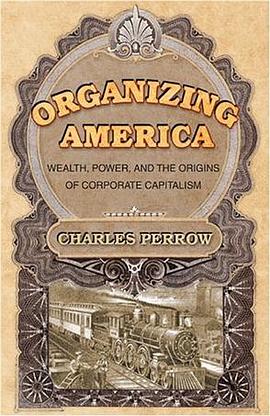
Organizing America pdf epub mobi txt 电子书 下载 2026
- 社会学
- 美國
- 经济社会学
- 组织
- 美国
- 社会史
- 比较历史社会学
- Economic-Sociology
- 美国政治
- 社会运动
- 制度分析
- 公共管理
- 历史研究
- 组织理论
- 民主治理
- 政策制定
- 公民参与
- 社会变革

具体描述
American society today is shaped not nearly as much by vast open spaces as it is by vast, bureaucratic organizations. Over half the working population toils away at enterprises with 500 or more employees--up from zero percent in 1800. Is this institutional immensity the logical outcome of technological forces in an all-efficient market, as some have argued? In this book, the first organizational history of nineteenth-century America, Yale sociologist Charles Perrow says no. He shows that there was nothing inevitable about the surge in corporate size and power by century's end. Critics railed against the nationalizing of the economy, against corporations' monopoly powers, political subversion, environmental destruction, and "wage slavery." How did a nation committed to individual freedom, family firms, public goods, and decentralized power become transformed in one century?</p>
Bountiful resources, a mass market, and the industrial revolution gave entrepreneurs broad scope. In Europe, the state and the church kept private organizations small and required consideration of the public good. In America, the courts and business-steeped legislators removed regulatory constraints over the century, centralizing industry and privatizing the railroads. Despite resistance, the corporate form became the model for the next century. Bureaucratic structure spread to government and the nonprofits. Writing in the tradition of Max Weber, Perrow concludes that the driving force of our history is not technology, politics, or culture, but large, bureaucratic organizations.</p>
Perrow, the author of award-winning books on organizations, employs his witty, trenchant, and graceful style here to maximum effect. Colorful vignettes abound: today's headlines echo past battles for unchecked organizational freedom; socially responsible alternatives that were tried are explored along with the historical contingencies that sent us down one road rather than another. No other book takes the role of organizations in America's development as seriously. The resultant insights presage a new historical genre.</p>
作者简介
Charles Perrow (Ph.D. University of California, Berkeley, 1960) is a past Vice President of the Eastern Sociological Society; a Fellow of the Center for Advanced Study in the Behavorial Sciences (1981-2, 1999); Fellow of the American Academy for the Advancement of Science; Resident Scholar, Russell Sage Foundation, 1990-91; Fellow, Shelly Cullom Davis Center for Historical Studies, 1995-96; Visitor, Institute for Advanced Studies, 1995-96, Princeton University; former member of the Committee on Human Factors, National Academy of Sciences, of the Sociology Panel of the National Science Foundation, and of the editorial boards of several journals. An organizational theorist, he is the author of six books, including: The Radical Attack on Business (1972), Organizational Analysis: A Sociological View (1970), Complex Organizations: A Critical Essay (1972; 3rd ed., 1986), award winning Normal Accidents: Living with High Risk Technologies (1984; revised, 1999), award winning The AIDS Disaster: The Failure of Organizations in New York and the Nation (1990) with Mauro Guillen, award winning Organizing America: Wealth, Power, and the Origins of American Capitalism (2002) and over 50 articles. His interests include the development of bureaucracy in the 19th Century; the radical movements of the 1960s; Marxian theories of industrialization and of contemporary crises; accidents in such high risk systems as nuclear plants, air transport, DNA research and chemical plants; protecting the nation’s critical infrastructure; the prospects for democratic work organizations; and the origins of U.S. capitalism.
目录信息
CHAPTER 1: Introduction 1
Some Central Concepts 3
Density and concentration 3
Size and small-firm networks 4
Organizations or capitalism 6
Noneconomic organizations 7
Power 8
Culture and other shapers of society 9
Organizations as the independent variable 10
What Do Organizations Do? 12
What Kind of Organizations? 16
Alternative Theories 17
Conclusion 19
CHAPTER 2: Preparing the Ground 22
Communities, Markets, Hierarchies, and Networks 22
Community 23
The market direction 25
Toward hierarchy and networks 28
The Legal Revolution that Launched Organizations 31
Fear of corporations 33
What organizations need to be able to do 35
Making capitalism corporate 36
Capitalism to Corporate Capitalism 40
Lawyers: "The Shock Troops of Capitalism" 43
CHAPTER 3: Toward Hierarchy: The Mills of Manayunk 48
Getting the Factory Going: The Role of Labor Control 48
The first mill-a workhouse 50
To mechanize or not? 51
Social Consequences 53
Labor Policies and Strikes 58
Organizations and Religion 60
From Working Classes to a Working Class 61
The politics of class 62
Conclusion 63
CHAPTER 4: Toward Hierarchy and Networks 65
Lowell and the Boston Associates 65
Wage dependence and labor control 65
Lowell I: The benign phase 67
Profits and market control 69
Lowell II: The exploitive phase 70
Explaining the First Modern Business 75
Structural constraints 77
The Slater Model 79
Toward Networks with the Philadelphia Model 81
When capital counts 82
Philadelphia's large mills 84
Size and technology 86
Networks of Firms 88
Labor conflict 90
Externalities 90
The Decline of Textile Firms 92
Summary 94
CHAPTER 5: Railroads, the Second Big Business 96
Railroads in France, Britain, and the United States: The Organizational Logic 102
France 104
Britain 108
The importance of the railroads 111
Why Were the Railroads Unregulated and Privatized? 113
The efficiency argument 115
Historical institutionalism 117
Historical institutionalism assessed 122
The neoinstitutionalist account 123
The organization interest account 127
The details 129
Self-interested opposition to the railroads 139
Corruption Observed but Not Interpreted 141
Evidence from the public record, and the outcry 144
Scholars explain corruption 151
Summary and Conclusions 157
CHAPTER 6: The Organizational Imprinting 160
Making the Railroads Work 160
Divisionalization 161
Finance takes charge 162
Inevitable, or a chance path? 165
Contracting out 166
Leadership Style and Worker Welfare 173
Work in general 175
Nationalization and Centralization: The Final Spike 179
Organizational versus political interpretations 180
Where did the money come from? 183
Regionalization versus Nationalization 186
The debate over the ethos 187
A political or an organizational interpretation of the struggle? 192
Was Regionalism Viable? 194
Concentrating Capital and Power 196
The corporate form triumphs 197
Explaining the arrival of the corporate form 201
An organizational agency account 204
Summary and Conclusions 212
CHAPTER 7: Summary and Conclusions 217
Appendix Alternative Theories Where Organizations Are the Dependent Variable 229
Notes 237
Bibliography 243
Index 251
· · · · · · (收起)
读后感
This book memo is written as an assignment for the course Co-evolution of States and Markets, taught at University of Chicago by Prof. John Padgett. ========================== Capitalists seek profits, but the organizations that they build in the process...
评分This book memo is written as an assignment for the course Co-evolution of States and Markets, taught at University of Chicago by Prof. John Padgett. ========================== Capitalists seek profits, but the organizations that they build in the process...
评分This book memo is written as an assignment for the course Co-evolution of States and Markets, taught at University of Chicago by Prof. John Padgett. ========================== Capitalists seek profits, but the organizations that they build in the process...
评分This book memo is written as an assignment for the course Co-evolution of States and Markets, taught at University of Chicago by Prof. John Padgett. ========================== Capitalists seek profits, but the organizations that they build in the process...
评分This book memo is written as an assignment for the course Co-evolution of States and Markets, taught at University of Chicago by Prof. John Padgett. ========================== Capitalists seek profits, but the organizations that they build in the process...
用户评价
“Organizing America”——这个名字自带一种力量感,仿佛预示着一场关于社会结构和公民参与的深入探索。我设想,这本书可能不仅仅是在描绘美国的组织图景,更是在揭示这些组织如何改变美国,或者说,美国是如何被这些组织塑造的。我迫切想知道,作者是如何处理历史与现实的联系的。是按照时间线索,从早期社会组织形态讲到现代,还是以主题的方式,比如“经济组织”、“政治组织”、“社会运动组织”等等来展开?我特别期待书中能够深入剖析那些具有里程碑意义的组织变革。例如,独立战争时期的“自由之子”之类的秘密结社,是如何为独立奠定基础的?西进运动中,那些自发形成的定居点组织,是如何在蛮荒之地建立秩序的?近代史上,那些为争取劳工权益、妇女权利、种族平等的组织,是如何推动社会进步的?我希望书中能够用生动的故事和扎实的史料,来呈现这些组织在历史洪流中的身影,它们是如何在特定环境下孕育而生,又如何在时代的浪潮中扮演关键角色的。我希望它能让我看到,每一个看似微小的组织单位,都可能蕴藏着改变历史的巨大能量,而“Organizing America”或许就是那本讲述这些能量如何汇聚、如何爆发的书。
评分一本名为“Organizing America”的书,光是听名字就觉得它承载了某种宏大的使命感,仿佛能看到美国这片土地上,那些曾经的、现在的、以及未来的组织力量是如何塑造并推动着国家前行的。我想象着作者一定对美国社会发展的脉络有着深刻的洞察,从早期的殖民地互助会,到工业革命时期工会的崛起,再到民权运动中的 grassroots 组织,亦或是如今大数据时代下各种线上社群的兴盛,这些都构成了“Organizing America”的丰富内容。我特别期待书中能深入探讨这些组织是如何在不同的历史时期,面对不同的挑战,发挥出它们独有的作用。是仅仅关注政治层面的组织,还是也涵盖了社会、文化、经济等更广泛的领域?例如,宗教团体在社区建设中的角色,非营利组织在解决社会问题上的创新,甚至是最日常的邻里互助,这些是否都会被纳入“Organizing America”的视野?我猜想,书中应该会通过大量的案例分析,来佐证作者的观点,让那些抽象的理论变得鲜活起来。我希望它能揭示出,正是这些看似分散却又紧密相连的组织网络,构成了美国社会运转的基石,也是其能够不断适应变化、实现自我革新的关键所在。它或许能帮助我理解,一个国家的活力,很大程度上取决于其公民参与社会事务的热情和能力。
评分“Organizing America”这个书名,立刻勾起我对于美国社会复杂性与活力的好奇。我脑海中浮现的是无数个不同规模、不同目的的团体,它们如同神经网络般交织在美国社会的每一个角落。这本书,我想象中一定是对这些“组织”的一次全面梳理和深度解读。我特别感兴趣的是,作者是如何去衡量和评价这些组织的“成功”与否的?是仅仅看其规模和影响力,还是会更关注其对社会公平、公民福祉的实际贡献?我期待书中能够提供一些关于组织创新和变革的案例,例如,那些突破传统模式、适应时代变化的组织,它们是如何做到的?又或者,那些在面临巨大阻力时,依然能够坚持并最终取得成功的组织,它们的核心驱动力是什么?我希望书中能够深入探讨,在信息时代,组织的形式和运作方式发生了怎样的变化。例如,社交媒体和互联网技术是如何被用来动员和组织人群的?这些新兴的组织模式,又带来了哪些新的机遇和挑战?“Organizing America”听起来像是对美国社会“肌体”的一次透视,它或许能帮助我理解,美国社会的韧性与创造力,很大程度上来自于其公民能够自由地组成各种组织,并为共同的目标而努力。我希望它能为我揭示出,一个健康的社会,离不开活跃的公民参与和有效的组织协调。
评分仅仅从书名“Organizing America”来推测,我感觉到这可能是一本关于美国社会结构、权力运作以及公民社会发展演变的大型叙事。我很好奇作者的切入点是什么,是自上而下的宏观分析,还是自下而上的微观视角?我希望书中能够提供一种全新的观察美国社会的方式,不仅仅是关注政治体制和经济数据,而是深入到那些组成社会肌体的“组织”本身。我猜想,书中可能会探讨不同时期美国社会面临的核心问题,以及这些问题是如何通过各种形式的组织来应对和解决的。比如,美国早期如何在广袤的土地上建立起高效的通信和交通网络?在面对经济危机时,各种互助组织和慈善机构又是如何发挥作用的?在文化多元化的背景下,不同族裔和社群的组织又是如何维系其独特身份并促进融合的?我期待书中能够呈现一种动态的、充满活力的美国社会形象,一个不断通过各种组织活动来调整、优化、甚至革命自身的社会。我希望它能启发我思考,在一个日益复杂的社会里,个体如何才能有效地参与其中,如何才能通过组织的力量来表达自己的声音,并最终影响社会的走向。这本书,听起来就像是现代美国社会的一部“演化史”,充满了变革与希望。
评分拿到“Organizing America”这本书,我脑海中立刻浮现出一种图像:一张巨大的拼图,而这本书则是在讲述如何将那些零散的、形状各异的拼块——也就是美国的各种组织——巧妙地组合在一起,最终形成一幅完整而壮丽的画卷。我很好奇作者是如何界定“组织”的范围的,是仅限于正式的机构,还是也包括那些非正式的、自发形成的社群?我特别希望书中能够详细阐述,不同类型的组织之间是如何相互作用、相互影响的。例如,一个成功的社区倡导组织,是否能影响到政府的政策制定?一个强大的工会,又会对企业管理产生怎样的变革?我期待书中能够提供一些关于组织效率和效能的深度分析,例如,在面对资源有限的情况下,不同的组织结构和运营模式会带来怎样的结果?又或者,在信息爆炸的时代,如何才能确保组织信息的传递不失真,并且能够有效地动员成员?我甚至在想,书中会不会探讨一些关于“无效组织”的案例,以及它们失败的原因,从中吸取教训?“Organizing America”听起来就像是美国社会的一本“操作手册”,它或许能帮助我理解,为什么在某些时期,美国社会能够展现出惊人的凝聚力和行动力,而在另一些时期,则可能显得有些分裂和低效。这种对组织运作机制的深入剖析,无疑是对理解现代社会运作方式的一大贡献。
评分英文书评豆瓣居然都要审核啊……变聪明了啊
评分英文书评豆瓣居然都要审核啊……变聪明了啊
评分英文书评豆瓣居然都要审核啊……变聪明了啊
评分英文书评豆瓣居然都要审核啊……变聪明了啊
评分英文书评豆瓣居然都要审核啊……变聪明了啊
相关图书
本站所有内容均为互联网搜索引擎提供的公开搜索信息,本站不存储任何数据与内容,任何内容与数据均与本站无关,如有需要请联系相关搜索引擎包括但不限于百度,google,bing,sogou 等
© 2026 book.wenda123.org All Rights Reserved. 图书目录大全 版权所有




















